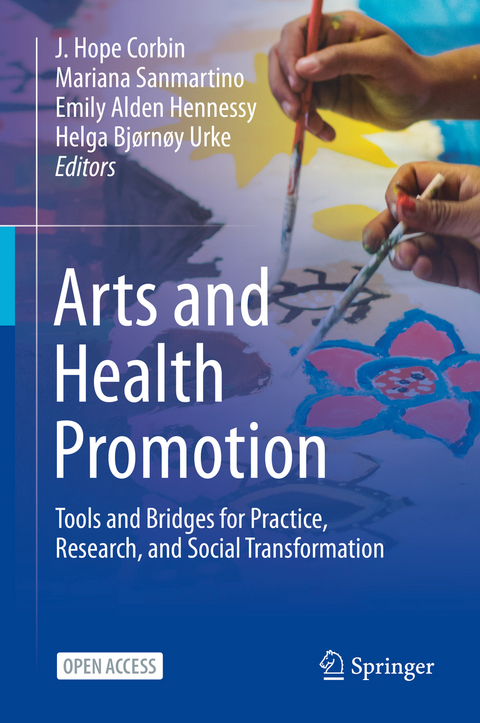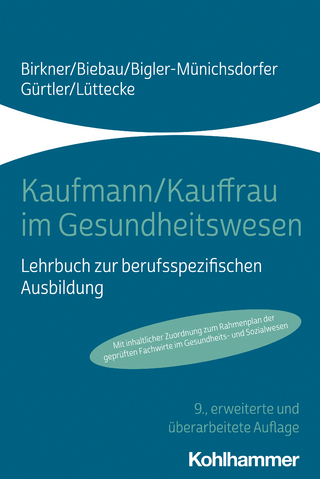
Arts and Health Promotion
Springer International Publishing (Verlag)
978-3-030-56416-2 (ISBN)
This open access book offers an overview of the beautiful, powerful, and dynamic array of opportunities to promote health through the arts from theoretical, methodological, pedagogical, and critical perspectives. This is the first-known text to connect the disparate inter-disciplinary literatures into a coherent volume for health promotion practitioners, researchers, and teachers. It provides a one-stop depository for using the arts as tools for health promotion in many settings and as bridges across communities, cultures, and sectors.
The diverse applications of the arts in health promotion transcend the multiple contexts within which health is created, i.e., individual, community, and societal levels, and has a number of potential health, aesthetic, and social outcomes. Topics covered within the chapters include:- Exploring the Potential of the Arts to Promote Health and Social Justice
- Drawing as a Salutogenic Therapy Aid for Grieving Adolescents in Botswana
- Community Theater for Health Promotion in Japan
- From Arts to Action: Project SHINE as a Case Study of Engaging Youth in Efforts to Develop Sustainable Water, Sanitation, and Hygiene Strategies in Rural Tanzania and India
- Movimiento Ventana: An Alternative Proposal to Mental Health in Nicaragua
- Using Art to Bridge Research and Policy: An Initiative of the United States National Academy of Medicine
Arts and Health Promotion is an innovative and engaging resource for a broad audience including practitioners, researchers, university instructors, and artists. It is an important text for undergraduate- and graduate-level courses, particularly in program planning, research methods (especially qualitative methodology), community health, and applied art classes. The book also is useful for professional development among current health promotion practitioners, community nurses, community psychologists, public health professionals, and social workers.
lt;p>J. Hope Corbin is associate professor and director of the Human Services program in the department of Health and Community Studies at Western Washington University in Bellingham. Her scholarship focuses on intersectoral collaboration to reduce inequity in the social determinants of health and on partnership as a mechanism for leveraging diverse ways of knowing, and power, for emancipatory health promotion. She is particularly interested in North-South partnership and promoting equity in global health promotion research. She is also focused on how incorporating the arts in health promotion practice, research, and social mobilization can provide a promising pathway toward transformation, liberation and healing for individuals, settings, communities and societies. Hope serves as Vice President for the International Union for Health Promotion and Education's (IUHPE) North American Region, Faculty Mentor to the IUHPE's Student and Early Career Network, and as Deputy Editor-in Chief to Health Promotion International.
Mariana Sanmartino (PhD in Education Sciences) is a biologist and a specialist in Social Sciences and Health and in Epistemologies of the South. She works as a researcher for the National Board of Scientific and Technical Research (CONICET) in the Grupo de Didáctica de las Ciencias in La Plata, Argentina. She is the founder and coordinator of the group ¿De qué hablamos cuando hablamos de Chagas? (What do we speak about when we speak about Chagas?), whose main objective is to promote an understanding of Chagas disease from an integrated and innovative perspective, linking multiple voices, diverse artistic expressions and unconventional scenarios. The guiding thread of her career is the search for elements that make it possible to understand the problem of Chagas from an integral perspective highlighting the role of education and communication as key tools to address this complex and current issue. Mariana is Member of the Advisory Board of the International Federation of Associations of People Affected by Chagas Disease (FINDECHAGAS), and serves as part of the Technical Group No.6 on Information, Education and Communication (TG6-IEC Chagas) of the WHO Chagas disease control program.
Emily Alden Hennessy (PhD in Community Research and Action) is a research assistant professor in the Institute for Collaboration on Health, Intervention and Policy at the University of Connecticut in Storrs. Her scholarship focuses on adolescent and emerging adult health and development, with a focus on problematic substance use and recovery. In this work she combines developmental and ecological perspectives to address programs and settings for youth health, such as families and schools. Her work also involves various qualitative and quantitative research methodologies, and includes developing best practices for evidence syntheses. She is an associate methods editor for the International Coordinating Group of the Campbell Collaboration.
Helga Bjørnøy Urke (PhD in Child Health Promotion) is associate professor in Health Promotion and affiliated with the Master's program Global Development: Theory and Practice, which includes a specialization in Health Promotion for Development. Her scholarship focuses on early child care, and child and adolescent mental, physical and social health and development. The socioecological and resource perspective dominates in her work, with particular emphasis on the family, school and community as important health promoting settings.
Part 1 . Introduction.- Chapter 1 . Exploring the Potential of the Arts to Promote Health and Social Justice.- Part 2. Arts and Health Promotion: Tools and Bridges for Practice.- Chapter 2. Drawing as a Salutogenic Therapy Aid for Grieving Adolescents in Botswana.- Chapter 3. Promoting Spiritual Health: Using Poetry as a Coping Strategy for Iranian .- Chapter 4. Student Creativity and Professional Artwork in a School Food Intervention in Denmark.- Chapter 5. Creatively Healthy: Art in a Home Care Setting in Scotland.- Chapter 6. CuidarNos: Art and Social Work to Address Trauma among Gender-Based Violence Advocates After Hurricane María in Puerto Rico.- Chapter 7. Community Theater for Health Promotion in Japan.- Part 3. Arts and Health Promotion: Tools and Bridges for Research.- Chapter 8. Lights, Camera, (Youth Participatory) Action! Lessons from Filming a Documentary with Trans and Gender Non-Conforming Youth in the USA.- Chapter 9. From Arts to Action: Project SHINE as a Case Study of Engaging Youth in Efforts to Develop Sustainable Water, Sanitation, and Hygiene Strategies in Rural Tanzania and India.- Chapter 10. Photovoice for Health Promotion Research, Empowerment, and Advocacy: Young Refugee Stories from Turkey.- Chapter 11. Reframing Health Promotion Research and Practice in Australia and the Pacific: The Value of Arts-Based Practices.- Chapter 12. A Kaleidoscope of Words and Senses to (Re)Think the Chagas Problem: Experiences in Argentina and Brazil.- Chapter 13. Mapping the Discourse on the Health-Promoting Impacts of Community Arts.- Part 4. Arts and Health Promotion: Tools and Bridges for Social Transformation.- Chapter 14. Art and Co-Creation for the Community Promotion of Affective Sexual Health in Catalonia.- Chapter 15. ArtScience for Health Awareness in Brazil.- Chapter 16. The Western Australian Indigenous Storybook Spins Special Yarns.- Chapter 17. Silent Silhouettes: A Living Reminder of the Urgent Action Needed to End Gender-Based Violence in Trinidad and Tobago.- Chapter 18. Movimiento Ventana: An Alternative Proposal to Mental Health in Nicaragua.- Chapter 19. Using Art to Bridge Research and Policy: An Initiative of the United States National Academy of Medicine.- Chapter 20. Art and Innovation at International Health Promotion Conferences.- Part 5. Conclusion.- Chapter 21. Arts, Health Promotion, and Social Justice: Synergy in Motion.
"This book represents a bold step in the direction of increasing awareness of the role of the arts in health promotion, and as such is a hugely welcome contribution to the field of arts and health." (Stephen Clift, Nordic Journal of Arts, Culture and Health, Vol. 4 (1), 2022)
“This book represents a bold step in the direction of increasing awareness of the role of the arts in health promotion, and as such is a hugely welcome contribution to the field of arts and health.” (Stephen Clift, Nordic Journal of Arts, Culture and Health, Vol. 4 (1), 2022)
| Erscheinungsdatum | 09.04.2021 |
|---|---|
| Zusatzinfo | XIX, 367 p. 86 illus., 77 illus. in color. |
| Verlagsort | Cham |
| Sprache | englisch |
| Maße | 155 x 235 mm |
| Gewicht | 746 g |
| Themenwelt | Studium ► Querschnittsbereiche ► Prävention / Gesundheitsförderung |
| Schlagworte | Applied Arts • arts-related research • art therapy • Community Health • creative arts, health, and well-being • Cultural diversity • Health Communication • Health disparities • health education • health equity • health humanities • Health Promotion • indigenous health promotion • Interdisciplinary • Medical Humanities • open access • Public Health • Qualitative research • Social Justice • socio-environmental health |
| ISBN-10 | 3-030-56416-9 / 3030564169 |
| ISBN-13 | 978-3-030-56416-2 / 9783030564162 |
| Zustand | Neuware |
| Haben Sie eine Frage zum Produkt? |
aus dem Bereich


